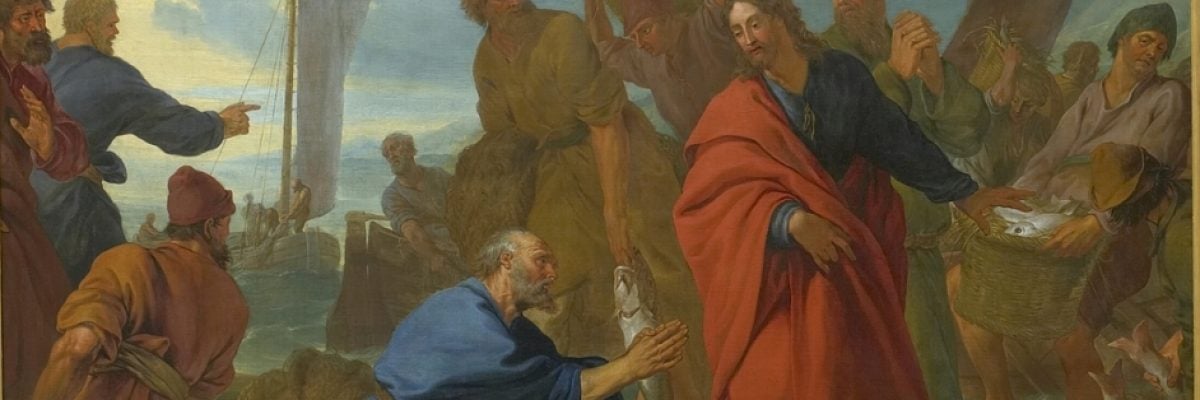
Homily for the Fifth Sunday in Ordinary Time, Year C
While the crowd was pressing in on Jesus and listening
to the word of God,
he was standing by the Lake of Gennesaret.
He saw two boats there alongside the lake;
the fishermen had disembarked and were washing their nets.
Getting into one of the boats, the one belonging to Simon,
he asked him to put out a short distance from the shore.
Then he sat down and taught the crowds from the boat.
After he had finished speaking, he said to Simon,
“Put out into deep water and lower your nets for a catch.”
Simon said in reply,
“Master, we have worked hard all night and have caught nothing, but at your command I will lower the nets.”
When they had done this, they caught a great number of fish and their nets were tearing.
They signaled to their partners in the other boat
to come to help them.
They came and filled both boats
so that the boats were in danger of sinking.
When Simon Peter saw this, he fell at the knees of Jesus and said,
“Depart from me, Lord, for I am a sinful man.”
For astonishment at the catch of fish they had made seized him and all those with him,
and likewise James and John, the sons of Zebedee,
who were partners of Simon.
Jesus said to Simon, “Do not be afraid;
from now on you will be catching men.”
When they brought their boats to the shore,
they left everything and followed him.-Luke 5:1-11
“Cemeteries are full of the bodies of indispensable men.” This saying has been attributed to Winston Churchill and to General De Gaulle. The not-so-gentle irony of this saying is too clear, especially coming from men as competent, powerful, and influential as these.
The fact is, death is a proof that we are not indispensable. The world will get on without us, in fact. With our death, others will take up our work; our friends and families will continue without our help until they too join us in the graveyard.
No one was ever given a public role or an authority greater than that given to Peter, the prince of the apostles, the chosen vicar of Christ. And yet he did not view himself as indispensable. On the contrary! This Gospel passage gives us an understanding of why the Savior chose Simon, son of John, for this office with all its duties and burdens.
Peter was truly humble in a direct and unaffected way. Notice how in the Gospel lesson he does not hesitate to raise an objection to the Lord’s direction that he “put out into the deep.” Peter had a key quality of truly humble people: he was no manipulator. He was forthright and simple, even when he was wrong.
But then note that he still immediately obeyed the Lord and did as he commanded. This is another key trait of a humble man: he is willing to obey, he is flexible, he is able to set aside his own opinions. He never thinks that his point of view is something indispensable.
Then there is the greatest proof of Peter’s humility, which made him so fit for his office: when confronted with the almighty power of God, when he himself had become the instrument of a miracle, this only made him more conscious of his littleness before the Savior. Far from confirming him in some opinion that he was meant to be chosen or exceptional, he fled that thought utterly, and begged to be relieved of such a burden.
St. Peter was not only no manipulator. And not only was he not willful, he was also utterly lacking in ambition. Such a man, filled with the love of Christ and supported by his grace, might well be Christ’s very representative on earth.
Those who hold high office in the Church or state, and those who have solemn responsibilities in their own families and religious communities and professions and workplaces, can only safely govern or direct or instruct when they are consciously, habitually aware of their unworthiness and insufficiency. This is an all-important quality of soul, since it guarantees that they will depend on the grace of God and that they will have courage in doing what they ought or must do, being more detached from the opinions of others and their own passions.
They are not, as we say nowadays, “codependents” operating from a sense of anxious control, but free men, willing to do as the Lord requires. Thus, as we read, “They left everything and followed him.”
Only this blessed attitude protects the loving heart from self-deception and illusion. The Desert Fathers, beginning with St. John Climacus, call Peter’s kind of contrite humility shown in today’s Gospel “joy-making sorrow.” Imagine the peace and confidence of Peter, supported only by the Lord’s command, and not having to depend on his own weakness. The awareness of sin brings sorrow, but the love of Christ fills the heart with loving gratitude, even in the midst of tears.
Let us pray for those who have the duty of directing others, that they will never view themselves and indispensable, but always as repentant men, willing to accomplish Christ’s word. After all, it was Peter who at the end, before his death, regarded himself being unworthy even of shameful crucifixion, and so reached his glorious goal, leaving all to follow Christ. And so all the world comes to Rome to venerate the grave of this “indispensable man.”



